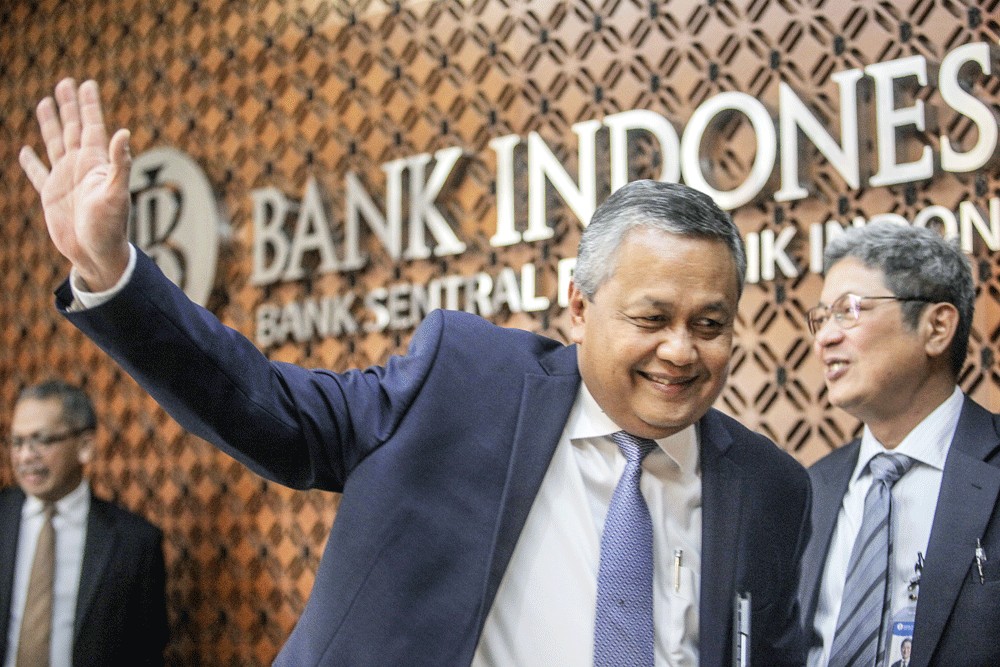Popular Reads
Top Results
Can't find what you're looking for?
View all search resultsPopular Reads
Top Results
Can't find what you're looking for?
View all search resultsBank Indonesia hints at rate cuts as it monitors global risks
Change text size
Gift Premium Articles
to Anyone
 Bank Indonesia Governor Perry Warjiyo waves to journalists after a media briefing at his office in Jakarta on Nov. 15, 2018. Indonesia’s central bank said on Thursday it will consider whether there’s room to ease monetary policy, the first indication it’s given this year of possible interest-rate cuts to unwind a series of hikes in 2018. (Antara/Muhammad Adimaja)
Bank Indonesia Governor Perry Warjiyo waves to journalists after a media briefing at his office in Jakarta on Nov. 15, 2018. Indonesia’s central bank said on Thursday it will consider whether there’s room to ease monetary policy, the first indication it’s given this year of possible interest-rate cuts to unwind a series of hikes in 2018. (Antara/Muhammad Adimaja)
I
ndonesia’s central bank said on Thursday it will consider whether there’s room to ease monetary policy, the first indication it’s given this year of possible interest-rate cuts to unwind a series of hikes in 2018.
Bank Indonesia left its benchmark interest rate unchanged at 6 percent, as expected, with Governor Perry Warjiyo telling reporters in Jakarta that the policy stance is “cautious neutral” and data dependent.
After 175 basis points of hikes last year, policy makers in Southeast Asia’s biggest economy are reluctant to ease too quickly to avoid destabilizing the currency, which is already under renewed pressure from rising U.S-China trade tensions and a global slowdown. Central banks in the Philippines, Malaysia, India and New Zealand have already cut interest rates this year.
Bank Indonesia said it will remain vigilant of global financial market dynamics and external stability “with due consideration to the space available for accommodative monetary policy in line with low inflation and the need to stimulate domestic economic growth.”
Warjiyo painted a picture of a slowing economy, still wide current-account deficit and subdued inflation. He said growth will be below the midpoint of the central bank’s 5% to 5.4% forecast range for this year, while the current-account shortfall will be higher than previously estimated in a range of 2.5% to 3% of gross domestic product.
The government has struggled to rein in the deficit, which is seen as a key vulnerability for the economy and the currency. Indonesia posted its biggest trade gap in more than a decade in April, putting pressure on the current account.
Key Highlights from Bank Indonesia GDP growth in 2019 seen below midpoint of 5-5.4 percent forecast range CPI seen below midpoint of 2.5-4.5 percent target in 2019 Current account deficit seen at 2.5-3 percent of GDP in 2019 Rupiah expected to move stably in line with market mechanisms going forward Central bank to maintain accommodative macroprudential policies
The rupiah has already taken a knock from the worsening global outlook, with the currency down more than 2.6 percent against the dollar in the past month. It fell 0.1 percent to 14,465 as of 8:25 a.m. in Jakarta on Friday, heading for its fourth straight weekly decline.
“Unless market sentiment materially improves in the coming weeks, the odds are that BI will opt to be patient and make its move only in the second half of this year,” Krystal Tan and Sanjay Mathur, economists at Australia and New Zealand Banking Group Ltd. in Singapore, said in a note.
Indonesia officials are worried about potential spillovers from the US-China trade war. Warjiyo also said on Thursday the global economic recovery is progressing slower than expected, financial market uncertainty is back on the rise and China’s economy is sluggish despite policy stimulus from authorities there.









